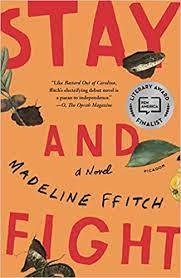This first novel was a finalist for the prestigious Pen America Literary Award, a finalist for the Los Angeles Times Book Prize and the Lambda Literary Award for Lesbian fiction. This book follows people who – like almost everyone in Appalachia – are tempted to flee the region. The characters in this novel, however, decide not only to stay, but also to fight to make living conditions here better. The protagonist, Helen, moves to Appalachian Ohio, with her boyfriend to do the back-to-the-land thing, but he quits before the first winter. Neighbors Karen and Lily are expected a boy, so are preparing to leave the Women’s Land Trust, and Helen invites them to live with her. Their son, Perley, rounds out the main four characters. "Remarkable and gripping . . . The story is told in the alternating voices of Helen, Karen, Lily, and Perley, and ffitch navigates their personalities beautifully, creating complex, brilliantly realized characters. As the stakes rise, for both the family and the preservation of the region, the novel skewers stereotypes and offers only a messy, real depiction of people who fully embody the imperative of the novel’s title. This is a stellar novel.―Publishers Weekly, starred review. "A socially conscious story about environment, feminism, and children rights."―Adam Vitcavage. “Madeline ffitch is unafraid of a good fight. Her first novel is a rousing celebration of conflict, in particular the conflict that comes with being a family: unspoken tensions, philosophical disagreements, painful words, messy brawls. Stay and Fight makes the powerful argument that fighting within a family is necessary, formative; it’s the practice that prepares us to fight for our families when the time comes. Hers is the fiercest, wisest book about parenting that I’ve read in a very long time.” ―Sarah Shun-lien Bynum. Madeline ffitch got her unique last name from her father, who was born in Great Britain. She wrote a draft of this novel as her doctoral dissertation at Ohio University in Athens which she describes as the nearest town to the small farm where she lives. This earned her a PhD in 2018. In an essay in Granta about her experiences protesting pipeline construction with native people at Standing Rock, she wrote, “… Friends ask me about being a parent who also remains politically involved. They ask me what it’s like to bring my kids with me to demonstrations, meetings and trainings, to breastfeed while facing a cop in riot gear, to be peed on by my baby at a direct-action training, to carry my toddler piggyback while marching through the streets. They want to know what it was like to bring my two young children to Standing Rock.…The idea that political work is for young, idealistic, childless adults is one way to keep such work carefully controlled, to cast it as exceptional, a hobby for the privileged few, when of course it’s neither. It’s ordinary and necessary. So is parenting.”
New York: Picador/Farrar Straus and Giroux, a 2020 paperback edition of a 2019 release. 292 pages. Trade paperback.
